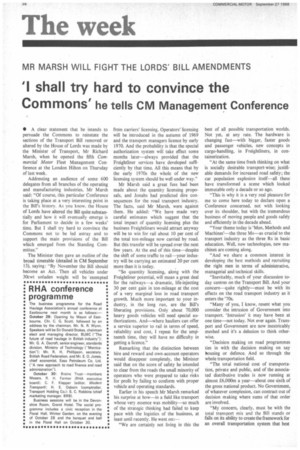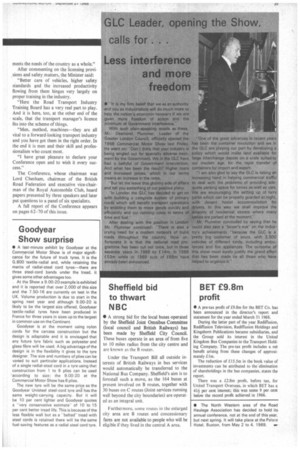MR MARSH WILL FIGHT THE LORDS' BILL AMENDMENTS
Page 40

Page 41

If you've noticed an error in this article please click here to report it so we can fix it.
'I shall try hard to convince the
Commons' he tells CM Management Conference • A clear statement that he intends to persuade the Commons to reinstate the sections of the Transport Bill removed or altered by the House of Lords was made by the Minister of Transport, Mr Richard Marsh, when he opened the fifth Commercial Motor Fleet Management Conference at the London Hilton on Thursday of last week.
Addressing an audience of some 600 delegates from all branches of the operating and manufacturing industries, Mr Marsh said: "Of course, this particular Conference is taking place at a very interesting point in the Bill's history. As you know, the House of Lords have altered the Bill quite substantially and how it will eventually emerge is for Parliament to decide in a few weeks' time. But I shall try hard to convince the Commons not to be led astray and to support the main provisions of the Bill which emerged from the Standing Committee."
The Minister then gave an outline of the broad timetable (detailed in CM September 13), saying: "By November the Bill should become an Act. Then all vehicles under 30cwt unladen weight will be -exempted
from carriers' licensing. Operators' licensing will be introduced in the autumn of 1969 and the transport managers licence by early 1970. And the probability is that the special authorization system will take effect some months later—always provided that the Freightliner services have developed sufficiently by that time, All this means that by the early 1970s the whole of the new licensing system should be well under way," Mr Marsh said a great fuss had been made about the quantity licensing proposals, and Jonahs had predicted dire consequences for the road transport industry. The facts, said Mr Marsh, were against them. He added: "We have made very careful estimates which suggest that the total impact of quantity licensing plus the business Freightliners would attract anyway will be to win for rail about 10 per cent of the total ton-mileage now carried by road. But this transfer will be spread over the next few years. At the end of this time—despite the shift of some traffic to rail—your industry will be carrying an estimated 20 per cent more than it is today.
"So quantity licensing, along with the Freightliner potential, will mean a great deal for the railways—a dramatic, life-injecting 30 per cent gain in ton-mileage at the cost of a very marginal loss in road transport growth. Much more important to your industry, in the long run, are the Bill's liberating provisions. Only about 70,000 heavy goods vehicles will need special authorizations. And—where hauliers can offer a service superior to rail in terms of speed, reliability and cost, I repeat for the umnteenth time, they will have no difficulty in getting a licence."
Remarking that the distinction between hire and reward and own-account operators would disappear completely, the Minister said that on the score of safety he intended to clear from the roads the small minority of operators who were prepared to take risks for profit by failing to conform with proper vehicle and operating standards.
Earlier in his speech Mr Marsh remarked his surprise at how—in a field like transport whose very essence was mobility—so much of the strategic thinking had failed to keep pace with the logistics of the business, at least until recently. He went "We are certainly not living in this the best of all possible transportation worlds. Not yet, at any rate. The hardware is changing fast—with bigger, faster goods and passenger vehicles, new concepts in cargo-handling, in Freightliners, in containerization.
"At the same time fresh thinking on what is socially desirable transport-wise; justifiable demands for increased road safety; the car population explosion itself—all these have transformed a scene which looked immutable only a decade or so ago.
"This is why it is a very real pleasure for me to come here today to declare open a Conference concerned, not with looking over its shoulder, but with the tremendous business of moving people and goods safely and efficiently in the decade ahead.
"Your theme today is 'Men, Methods and Machines'—the three Ms—as crucial to the transport industry as the three Rs in basic education. Well, new technologies, new machines are coming along.
"And we share a common interest in developing the best methcids and recruiting the right men in terms of administrative, managerial and technical skills.
"Inevitably, much of your discussion today centres on the Transport Bill. And your concern—quite rightly—must be with its effects on the road transport industry as it enters the '70s.
"Many of you, I know, resent what you consider the intrusion of Government into transport. 'Intrusion' it may have been at one time—not today. Not ever again. Transport and Government are now inextricably meshed and it's a delusion to think otherwise.
"Decision making on road programmes ties in with the decision making on say housing or defence. And so through the whole transportation field.
"The total national cost of transportation, private and public, and of the associated distributive trades is now running at almost £6,000m a year—about one sixth of the gross national product. No Government, of whatever complexion, can contract out of decision making where sums of that order are involved.
"My concern, clearly, must be with the total transport mix and the Bill stands or falls on its ability to create the framework for an overall transportation system that best
meets the needs of the country as a whole."
After commenting on the licensing provisions and safety matters, the Minister said:
"Better care of vehicles, higher safety standards and the increased productivity flowing from them hinges very largely on proper training in the industry.
"Here the Road Transport Industry Training Board has a very real part to play. And it is here, too, at the other end of the scale, that the transport manager's licence fits into the scheme of things.
"Men, method, machines—they are all vital to a forward-looking transport industry and you have got them in the right order. In the end it is men and their skill and professionalism who count most.
"I have great pleasure to declare your Conference open and to wish it every success."
The Conference, whose chairman was Lord Chesham, chairman of the British Road Federation and executive vice-chairman of the Royal Automobile Club, heard papers presented by three speakers and later put questions to a panel of six specialists.
A full report of the Conference appears on pages 62-70 of this issue.
































































































































































































